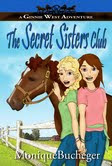I had the privilege of taking a class with THE "Grammar Girl", Mignon Fogarty, earlier this year and was impressed by her knowledge and articulate way of using the English language to EXPLAIN the many exceptions to the grammar rules in the English language.
Today she is running a contest to win a free-personalized copy of her book: Grammar Girl's 101 TROUBLESOME WORDS YOU'LL MASTER IN NO TIME. Please enter and if you don't win, please consider purchasing her book anyway. It is entertaining, interesting, and informative.
As a published author, it is important to me to make the appropriate word choices when writing my novels so that my readers are entertained and focused on my story, not drawn out of the story because of grammar errors.
From now on I will `try to' instead of `try and' follow the grammar rules, hoping that as I go toward (as opposed to towards) my goal of writing entertaining middle-grade novels, I will also succeed in not spreading ignorant grammar rules to impressionable readers. Before I read 101 Troublesome Words I couldn't (could) care less about some of these rules.
Now, thanks to Mignon's entertaining look at grammar etiquette, I care more. :)
I loved her format: Name the word, tell us why it was a problem, show us how it HAS BEEN used, show us how it SHOULD be used and give us permission (sometimes with restrictions, sometimes not) to use it in the `proper' the way which sometimes is the way we wanted to use it anyway, even though some grammarians would object.
She also gave examples of right ways and even more correct ways to use the troublesome word when there was a difference.
I love words, when strung together to tell a compelling story. Not so much when I have to dissect and second-guess them. Mignon Fogarty's 101 Troublesome Words takes the angst out of writing. Who better than Grammar Girl to teach us non-grammarians the dos and don'ts of proper writing?
(As a writer she assures me I can use dos and don'ts rather than do's and don'ts. Before I read this book, I had no idea there are actually three correct spellings--do's and don't's being the third option (and my spell check doesn't like it.) Now I know which way to spell which option to be correct. And thanks to her humorous perspective, I really do care.)
Thanks, Mignon. :)
Meowy Christmas!
7 years ago











0 comments:
Post a Comment